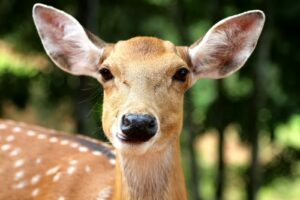
This summer, protect your garden from hungry wildlife with the following tips!
We all garden for different reasons: growing flowers for their beauty, growing native plants to help the ecosystem, or growing fruits and vegetables to eat. Either way, it’s terrible to head out to the garden and find everything has been eaten by wildlife. Here are five ways to protect your garden from more than just the heat this summer.
Fence It In
A fence is the only way to truly keep out the wildlife, and it works best if your garden is fenced from day one. That way, they won’t ever even find the food source. The height of your fence will depend on what’s eating your garden. It only needs to be a few feet for most bunnies, but consider burying the fence about 10” deep to prevent animals from burrowing under it. For deer, you’ll need a fence of at least 4 feet, but sometimes more. To keep the birds from your fruit bushes and trees, consider covering them with plastic bird netting at least a week before the berries ripen so that you get to enjoy the fruit too.
Scare Them Away or Try Repellents
Try metallic streamers or bird tape to scare away the birds. An old-fashioned scarecrow can also work, but you have to move it around periodically or the birds will get used to it. Motion activated lights or sprinklers can scare off many mammals that try to dine in your garden. There are also repellents that make the garden smell bad or make the plants taste bad. The animals learn not to eat there because it’s unpleasant, but they don’t get hurt.
Garden in Raised Beds or Pots
If your garden beds are raised at least 2 feet off the ground, you will eliminate a lot of your rabbit issues. If you garden in pots or window boxes, you can mount them on railings to keep them well out of the reach of many animals.
Don’t be Too Tidy
If you live in more rural areas, consider leaving the outer areas of your yard a little bit wild, especially with native plants. This will, hopefully, entice the critters to eat there instead of your garden.
Plant Less Tasty Plants
If there are a lot of animals competing in your area, this may not be enough to keep them out of your garden. However, choosing plants that are less appealing will often make the critters go elsewhere to search for food. Plants that are really aromatic, fuzzy, or have prickles are often not worth the trouble. You could also talk to your neighbors about what they’ve planted that the critters have left alone.
CONTACT AMERICAN NATIVE PLANTS
Whether you’re looking to restore a local wetland or beautify your property, American Native Plants can provide you with the right plants for the job. With an inventory of over 400,000 native trees, native shrubs, and herbaceous plants consider American Native Plants your one-stop shop for wholesale native plant needs. Peruse our catalog, give us a call, and follow us on Facebook, Twitter, and Google+!
